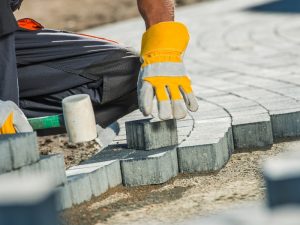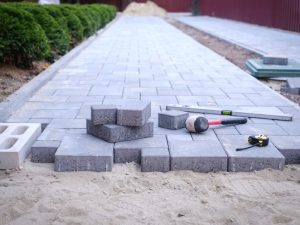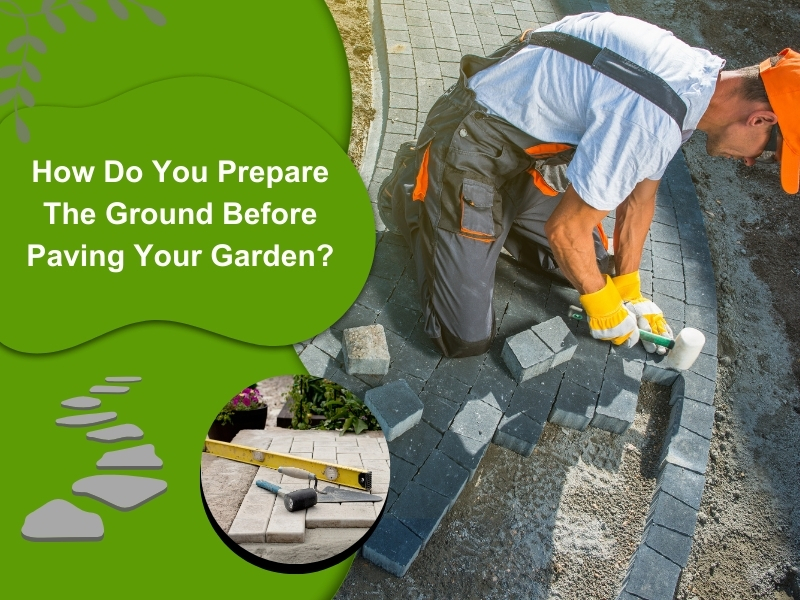Proper ground preparation for paving is essential to create a beautiful, durable paved area in your garden. Groundwork is one of the most critical aspects of paving, as it ensures the longevity and stability of the pavement. Whether you’re adding a pathway, patio, or driveway, proper preparation will ensure your paving lasts for years. This guide will walk you through the necessary steps to prepare the ground adequately for paving your garden.
Why is ground preparation important before paving your garden?
Ground preparation is crucial for several reasons. An adequately prepared base ensures your paving stones remain level, stable, and weed-free. Your paved surface might sink, crack, or unevenly without the correct foundation. Also, proper groundwork allows for adequate drainage, preventing water from pooling or damaging paving stones. Due to seasonal variations and occasional heavy rainfall, ground preparation is essential in Sydney’s climate. Well-prepared soil helps manage water flow and prevents erosion; poor drainage in gardens can lead to this.
What tools and materials do you need to prepare the ground for paving?
Before you begin preparing the ground, gather the following tools and materials:
- Shovel or spade
- Rake
- Wheelbarrow
- Level
- Measuring tape
- String line
- Hammer and stakes
- Compactor or plate compactor
- Base material (e.g., crushed stone, gravel)
- Sand (for levelling)
- Paving stones or slabs
Having the right tools ensures the job goes smoothly, making the entire process quicker and more efficient.
How do you measure and mark the paving area accurately?
Accurate measurements are essential for a neat, professional-looking paved area. Here’s how you can ensure precision:
- Measure the area: Use a measuring tape to determine the length and width of the area where you plan to lay the paving.
- Mark the area: Stretch a string line between stakes at the corners of the paving area. The string line will help you maintain straight paving lines, ensuring your finished project looks neat and well-aligned.
- Check the squareness: Use the 3-4-5 method (right-angled triangle) to check the corners’ squareness. This method will create a tidy, even shape for your paved area.
Properly marking the area helps avoid common paving project mistakes, such as misalignments, and ensures everything fits as planned.

What are the benefits of adding a paved area to your garden?
Adding a paved area to your garden can significantly enhance the space. Key benefits include:
- Increased aesthetic appeal: Paving adds structure and style to your garden.
- Low maintenance: Paving requires less upkeep than grassy areas.
- Improved accessibility: Paved paths offer stable surfaces, ideal for those with mobility challenges.
- Durability: Paving withstands heavy foot traffic and weather conditions.
- Added value to property: A well-designed paved area can increase property value with landscape design, boosting your property’s market value.
What steps are involved in clearing the ground before paving?
Clearing the ground is one of the first steps in preparation. Here’s what you need to do:
- Remove existing vegetation: Use a shovel or spade to remove any grass, plants, or weeds.
- Clear rocks and debris: Remove any rocks, roots, or other debris that could interfere with your paving.
- Level the ground: Use a rake to level the soil, creating a smooth surface for the next steps.
How should you level the ground for a stable paving foundation?
Levelling the ground is crucial for a stable paving foundation. Here’s how you can do it:
- Use a rake: Spread the soil evenly to ensure a smooth surface.
- Check with a level: Use a spirit level to ensure the surface is even after levelling.
- Slope for drainage: A slight slope (around 2%) away from buildings or structures encourages water flow and prevents pooling.
What types of base materials should you use for garden paving?
The suitable base materials help create a solid foundation for your paving, allowing you to choose the best paving stones for your garden and achieve a stunning outdoor space. Common options include:
- Crushed stone: a coarse material with excellent drainage and a solid base.
- Gravel: Another great option that offers good drainage and stability.
- Sand: Sand is often used as a bedding layer on top of the base material to level and set paving stones.

How do you compact the ground properly before paving?
Compacting the ground is necessary to ensure the base material doesn’t shift or settle over time. Here’s how to do it:
- Use a plate compactor: After laying your base materials, use a plate compactor to compress the soil and base material.
- Repeat the process: You may need to compact the base material in layers to ensure maximum stability.
- Check with a level: Ensure the surface remains even and smooth after compaction.
Proper compaction prevents your paved area from sinking or shifting after installation.
What drainage solutions are essential when preparing the ground for paving?
Good drainage is crucial to avoid water damage and erosion. Here are some drainage solutions to consider:
- Gravel base: A gravel base allows for efficient water flow.
- Drainage pipes: Installing drainage pipes can help direct water away from the paved area.
- Slope: Ensure your paved surface has a slight slope to encourage water to run off.
Why is it essential to hire professional services for garden paving?
While DIY paving can be tempting, there are many reasons to hire a professional service:
- Expertise: Professionals ensure proper ground preparation and efficient paving.
- Time-saving: They complete the job faster, so you can enjoy your garden sooner.
- Long-term results: Professional paving lasts longer and stays stable, saving on future repairs.
- High-quality materials: They use superior materials for a more durable and attractive finish.
Get your garden paving right
Proper ground preparation is essential for creating a durable, beautiful paved area in your garden. By clearing, levelling, compacting, and ensuring adequate drainage, you’ll make a solid foundation that ensures longevity. Whether doing it yourself or hiring professional paving services, proper ground preparation is crucial to avoid uneven surfaces or water damage. A well-paved garden enhances the aesthetics and adds functionality and value to your space.
A1 Gardening & Landscaping Sydney Sydney is your go-to for paving services in Sydney. We offer comprehensive solutions, from design and installation to repairs and maintenance. Our experienced team ensures top-quality workmanship and exceptional customer service. We use only the best materials and guarantee every project is completed on time and within budget. Transform your garden with A1 Gardening & Landscaping Sydney Sydney – let us bring your outdoor vision to life!



